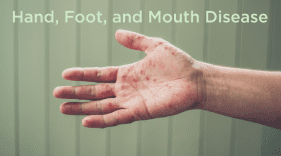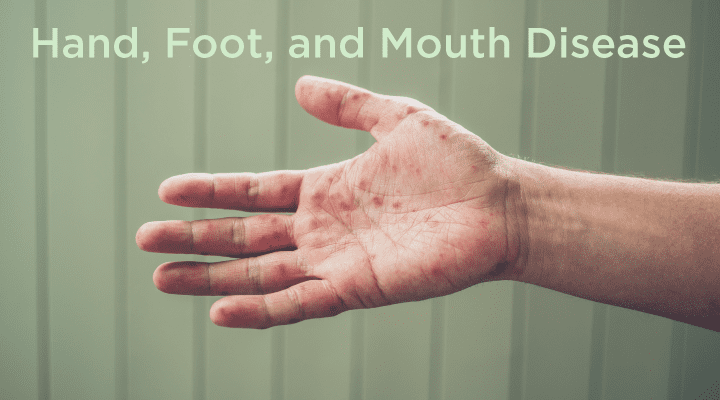Hand, Foot, and Mouth Disease and Oral Health

Hand, foot, and mouth disease is a viral infection that’s contagious and common in young children. In fact, 90% of all individuals diagnosed with hand, foot, and mouth disease are children under the age of 5. Visible symptoms include lesions (sores) in the mouth and a rash on the hands and feet.
Other symptoms of hand, foot, and mouth disease include:
- Fever
- Sore throat
- Fatigue and feeling unwell
- Red blister-like lesions on the tongue, gums, throat, and inside of the cheeks
- Loss of appetite
When we’re dealing with a viral disease, we usually head over to our primary care doctor. But should we also visit the dentist if a virus affects the mouth?
How Long Does Hand, Foot, and Mouth Disease Last?
Symptoms of hand, foot, and mouth disease can clear up in about a week. In rare cases, it can last as long as two weeks. The period when the disease is contagious usually lasts a week or less.
You can tell that the virus is clearing up when the fever subsides and the sores in the mouth have healed. This is most likely after the period of being contagious is over. In most cases, our own immune system clears up this viral disease in about 7-10 days.
According to Delta Dental of Wisconsin’s dental director, Dr. Greg Theis, “While the mouth sores can be painful, there really is no treatment other than simply providing relief of the symptoms. I would stay away from any oral rinses that “anesthetize” (make numb) the mouth as those can cause more harm than good. It’s just a 7-10 day viral outbreak which will pass with no permanent damage to the mouth.”
What Role Can a Dentist Play When It Comes to Hand, Foot, and Mouth Disease?
Since symptoms such as lesions and sores start in the mouth, your dentist can diagnose hand, foot, and mouth disease during a routine check-up. Otherwise, a viral infection such as this does not generally require an added trip to the dentist. Your primary care physician may recommend a dentist visit if they see fit. The first step is to contact your primary care doctor for their professional advice.
How Do You Get Rid of Hand, Foot, and Mouth Disease?
Unfortunately, there are no cures or vaccines for this disease. Doctors recommend treating the symptoms with over-the-counter pain relievers such as ibuprofen and acetaminophen.
Give your child cold, soft foods such as smoothies to help reduce discomfort in the mouth and throat. Also, it’s not recommended that children under the age of 18 use aspirin. It can cause a rare but serious illness called Reye syndrome.
Good hand washing is necessary to help prevent the spread of the disease, which is most common in the summer and fall. Additionally, offer your child plenty of fluids but avoid acid-containing juices, which can irritate mouth sores.
Many people look for a quick fix when it comes to hand, foot, and mouth disease, but rest and time are going to be the best aids.
Want to learn more about the connection between the mouth and body? Click here.
Related stories
-
Missing Teeth in the Rink: Hockey’s Mouthguard Mystery
Why do hockey players wear mouthguards? Here’s a hint: Next time you watch a hockey game, see … Read More
-
April is a Laughing Matter
A smile can do wonders for a person. It can make you feel happier, more confident, and … Read More
-
Guidance on healthcare reform, with more guidance in the forecast
Thanksgiving week was busy on the healthcare-reform front. The Department of Health and Human Services (HHS) released … Read More
Sign Up Now
Most Liked
- 1 Do Expiration Dates on Dental Products Matter? 305 Likes
- 2 Is Activated Charcoal Safe for your Smile? 167 Likes
- 3 Crazy and Cool Fish Teeth Facts 92 Likes
- 4 What Are Tonsil Stones? 81 Likes
- 5 Delta Dental Protects Your Eyes with DeltaVision® Coverage 74 Likes
- 6 The In-between Tooth: Guide to Bicuspids 53 Likes
- 7 Recipe: Quick Pumpkin Pudding 49 Likes
- 8 Bad Taste After Brushing? Common Explanations 44 Likes
- 9 People with Dental Benefits are Healthier 40 Likes
- 10 Own Your Oral Health: Subscribe now for tips to ensure a bright smile 39 Likes




